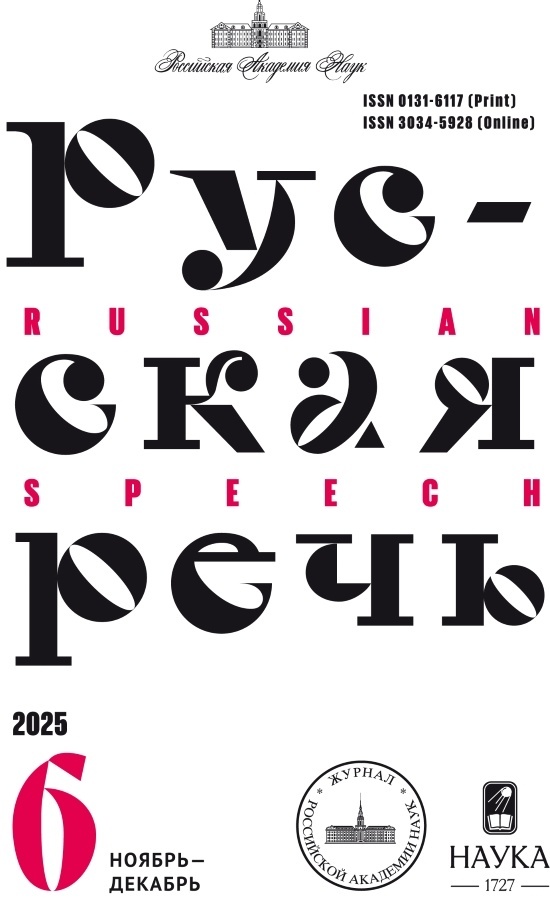Labor in the National Picture of the World of the Russian
- Authors: Kuz'minykh E.O.1, Bugakova N.B.1, Skuridina S.A.1
-
Affiliations:
- Voronezh State Technical University
- Issue: No 6 (2025)
- Pages: 41-53
- Section: Issues of Modern Russian Language
- URL: https://modernonco.orscience.ru/0131-6117/article/view/696182
- DOI: https://doi.org/10.31857/S0131611725060032
- ID: 696182
Abstract
The lexeme trud ('labor') expresses one of the basic moral and value concepts of any culture and is an important component of the linguistic consciousness of the nation, is reflected in which are proverbs and sayings. Based on the conducted research, it is concluded that work in the worldview of the Russian people is a necessity, which is an important part of life. It is not an internal human need, but is caused by external causes. The main characteristic of labor is severity, while the degree of pleasure from receiving benefits is directly proportional to the effort invested. Hard work is often perceived as a blessing, as it helps to atone for original sin and thereby brings a person closer to God. In this sense, it is contrasted with laziness, which has a devilish nature. A sign of a lazy person is a predilection for idle conversations, aimless loitering and contemplating the work of others. The latter is satisfying. Assessing the amount of labor effort is ambivalent: both laziness and excessive zeal are condemned. The balance of work and leisure is regulated by natural rhythms and church holidays. The attitude to work determines the moral qualities of a person, the degree of his honesty. The reward for work is usually unfair, but the result brings joy. The proverbs about work lack the idea of personal enrichment and accumulation for the next generation. Work is necessary when there is a need to satisfy personal needs. Mental work is valued above physical work and is the prerogative of the older generation. The boundary between women's and men's work is natural, the latter is considered to be of higher quality. In Russian proverbs, the concept of labor correlates with such categories as respect, prosperity, wealth and poverty, laziness, idleness, skill, honesty, etc. Negative characteristics include: the unfairness of the organization and remuneration, excessive severity, large volume, routine.
Keywords
About the authors
E. O. Kuz'minykh
Voronezh State Technical University
Author for correspondence.
Email: eleshka-82@yandex.ru
Voronezh
N. B. Bugakova
Voronezh State Technical University
Email: ya_witch@mail.ru
Voronezh
S. A. Skuridina
Voronezh State Technical University
Email: saskuridina@yandex.ru
Voronezh
References
- Alekseev A. V. [Cultural significance of the word labor in the 20th Century: reflexes of the Ancient Russian concept]. Vestnik Nizhegorodskogo universiteta im. N. I. Lobachevskogo, 2019, no. 2, pp. 164-170. (In Russ.)
- Basova L. V. Kontsept TRUD v russkom yazyke (na materiale poslovits i pogovorok): avtoref. diss. ... kand. filolog. nauk [The concept of LABOR in the Russian language (based on proverbs and sayings): cand. philol. sci. diss. abstr.]. Tyumen St. Univ., Tyumen, 2004. 20 p.
- Gonnova T. V. Kontsept TRUD v russkom yazyke (na materiale poslovits i pogovorok): avtoref. diss. ... kand. filolog. nauk nauk [Sociocultural characteristics of the concept of "labor" in the Russian linguistic consciousness: cand. philol. sci. diss.]. Volgograd St. Socio-Pedagogical Univ., Volgograd, 2003. 210 p.
- Dmitriev D. V. Tolkovyi slovar' russkogo yazyka [Explanatory dictionary of the Russian language]. Moscow, AST Publ., 2003. 1097 p.
- Evgen'eva A. P. (ed.). Slovar' russkogo yazyka: V 4-kh t. [Dictionary of the Russian language: In 4 vols.]. 3rd ed., ster. Vol. 3. Moscow, Russkii Yazyk Publ., 1983. 352 p.
- Efremova T. F. Novyi slovar' russkogo yazyka. Tolkovo-slovoobrazovatel'nyi [New dictionary of the Russian language. Explanatory and derivational.]. Vol. 2. Moscow, Russkii Yazyk Publ., 2000. 315 p.
- Krivko R. N. (ch. ed.). Slovar' russkogo yazyka XI-XVII vv. [Dictionary of the Russian language of the 11th-17th centuries]. Iss. 30. Moscow, Azbukovnik Publ., 2015. 320 p.
- Krys'ko V. B. (ch. ed.). Slovar' drevnerusskogo yazyka (XI-XIV vv.) [Dictionary of the Old Russian language (11th-14th centuries)]. Vol. 13. Moscow, Nestor-Istoriya Publ., 2023. 728 p.
- Kuznetsov S. A. (ch. ed.). Bol'shoi tolkovyi slovar' russkogo yazyka [Great explanatory dictionary of the Russian language]. St.-Petersburg, Norint Publ.; Moscow, Ripol Klassik Publ., 2008. 1534 p.
- Ozhegov S. I., Shvedova N. Yu. Tolkovyi slovar' russkogo yazyka: 80 000 slov i frazeologicheskikh vyrazhenii [Explanatory dictionary of the Russian language: about 100,000 words, terms and phraseological expressions]. 2nd ed. Moscow, AZb Publ., 1994. 928 p.
- Panchenko N. N. [National-specific interpretation of the concepts of "deception" / "lie" in the paremiological aspect]. Yazykovaya lichnost': verbal'noe povedenie: sb. nauch. tr. [Linguistic personality: verbal behavior: collection of sci. papers]. Volgograd: RIO Publ., 1998, pp. 26-30. (In Russ.)
- Ushakov D. N. Bol'shoi tolkovyi slovar' russkogo yazyka: sovremennaya redaktsiya [Great Explanatory dictionary of the Russian language: modern edition]. Moscow, Dom Slavyanskoi Knigi Publ., 2008. 959 p.











